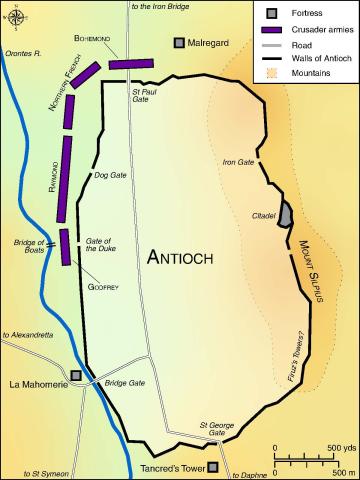The Crusaders Besiege Antioch
[6.16.1] Intereā inimīcus Tetigus, audiēns quod exercitus Turcōrum vēnissent super nōs, ait sē timuisse, arbitrānsque nōs omnēs perisse, atque in manibus inimīcōrum incīdisse, fingēns omnia falsa, dīxit: “Seniōrēs et virī prūdentissimī, vidēte quia nōs sumus hīc in maximā necessitāte, et ex nūllā parte nōbīs adiūtōrium succēdit. Ecce modo: sinite mē in Romāniae patriam revertī, et ego absque ūllā dubitātiōne faciam hūc multās nāvēs venīre per mare, onustās frūmentō, vīnō, hordeō, carne, farīnā et cāseīs, omnibusque bonīs quae sunt nōbīs necessāria. Faciam et equōs condūcī ad vēndendum, et mercātum per terram in fidēlitāte imperātōris hūc advenīre faciam. Ecce haec omnia vōbīs fidēliter iūrābō, et attendam. Adhūc quoque et domesticī meī et pāpiliō meus sunt in campō, unde et firmiter crēdite quia quantōcius redībō.”
[6.16.2] Sīc itaque fēcit fīnem dictīs. Fuit ille inimīcus: omnia sua dīmīsit in campō, et in periūriō manet et manēbit. Itaque tālī modō inerat nōbīs maxima necessitās, quia Turcī undique prestringēbant nōs, ita ut nūllus nostrōrum audēret iam exīre extrā tentōria. Nam illī cōnstringēbant nōs ex ūnā parte, et famēs cruciābat ex aliā. Succursus vērō et adiūtōrium nōbīs dēerat; gēns minūta et pauperrima fugiēbat Cyprum, Romāniam, et in montāneās. Ad mare utique nōn audēbāmus īre, propter timōrem pessimōrum Turcōrum; nusquam erat nōbīs via patefacta.
notes
vocabulary
6.16.1
absque: (prep. + abl.) apart from, without (OLD 2)
hordeum –ī, n.: barley
cāseus –ī, m.: cheese
attendō attendere attendī attentum: to pay attention (OLD 8)
adhūc: still
pāpiliō –ōnis, m.: (CL) butterfly; (ML) tent
campus –ī, m.: field (CL); battlefield, camp (ML)
6.16.2
utīque: without doubt, absolutely
nusquam: nowhere

